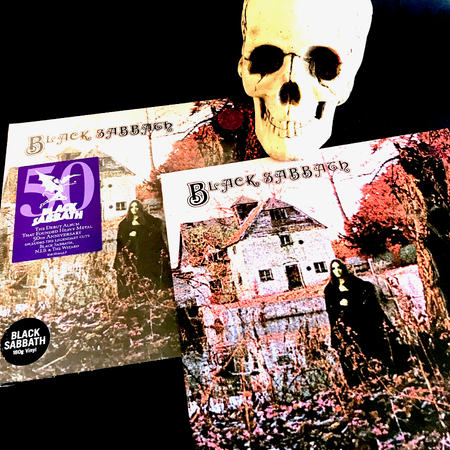NONE MORE BLACK
Author: Bruce Jenkins Date Posted:8 September 2023

The debut album by Birmingham’s Black Sabbath was released, fittingly, on Friday 13th of February 1970. Taking their name from a Boris Karloff horror film, the band was the first to map the territory of what would become a new genre. The LP, opines Ultimate Classic Rock, "entwines dark, disturbing lyrics with heavy propulsive music freighted with gravitas and dread in a brand new genre: heavy metal."
Black Sabbath by Black Sabbath opens with the track "Black Sabbath". You can’t make your statement of intent much clearer than that. Until, of course, the stylus hits the vinyl. There is a sombre tolling bell. There is a storm. The music is slow, dense and ominous, even before Ozzy Osbourne’s vocals enter to chill the listener even more. "Oh no, no, please God help me," he moans. It may sound like cliched dark metal now but back in the day, just weeks after the colourful Sixties had expired with a despairing sigh, it was almost shocking. What is this?
Things drift back into more familiar territory with the harmonica driven blues rock of "The Wizard". What’s notable about this second track is the introduction of another favourite theme in heavy rock: magic and fantasy. Furthermore, within two tracks we have the dichotomy of Ozzy’s lyrics laid out. The light-dark struggle weaves through all his best work, something those who are quick to push the outrage button often fail to recognise. Let’s hear more about this potent magic wielder Ozzy is singing about.
Evil power disappears
Demons worry when the wizard is near
He turns tears into joy
Everyone’s happy with the wizard walks by
More story-telling than satanism, really.
The legendary horror writer H.P. Lovecraft inspired "Behind The Wall Of Sleep", part of a conglomerate track that fills out the second half of side one. An essential component of the Sabbath sound is heard to great advantage here, as Geezer Butler’s bass drives things along through a feature spot ("Bassically") into the heaving riff of "N.I.B."and a classic Tony Iommi guitar squall. It is fair to say that this first side of Black Sabbath’s debut is essential listening for fans of early heavy rock, or indeed those fascinated by the Seventies rock explosion.
On the BMG 2015 re-issue (and other versions too) the second side leads off with a cover of Crow’s "Evil Woman" rather than "Wicked World" (which was on the original US release). There’s also an extended version of "Warning" by the Aynsley Dunbar Retaliation. Legendary critic Lester Bangs was unimpressed by Sabbath’s debut. His 1970 review in Rolling Stone magazine was far from complimentary.
The whole album is a shuck — despite the murky song titles and some inane lyrics that sound like Vanilla Fudge paying doggerel tribute to Aleister Crowley, the album has nothing to do with spiritualism, the occult, or anything much except stiff recitations of Cream clichés that sound like the musicians learned them out of a book, grinding on and on with dogged persistence. [Rolling Stone, 17 Sept. 1970]
In retrospect, it is clear Lester didn’t get it. The repetition, the barrage of mid-paced sludge pierced by jolts of guitar lightning is exactly what animated Black Sabbath, making them distinctive and memorable. Here be the roots of grunge, of doom metal, of stoner rock and several other heavy rock sub-genres. It is, without a shadow of doubt, the beginning of the Dark Ages. And after this powerful debut things would get even blacker.
Sources
Black Sabbath’s Debut: A Track By Track Guide To Metal’s Birth at Ultimate Classic Rock [Accessed 5 September 2023]
Black Sabbath Debut Album Review at Classic Rock History [Accessed 5 September 2023]
Black Sabbath by Lester Bangs at Rolling Stone [Accessed 5 September 2023]
© Bruce Jenkins—September 2023


